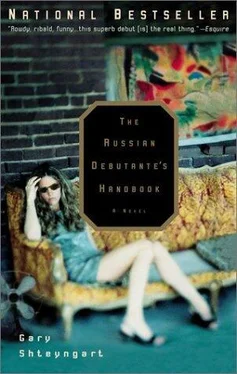Gary Shteyngart - The Russian Debutante's Handbook
Здесь есть возможность читать онлайн «Gary Shteyngart - The Russian Debutante's Handbook» весь текст электронной книги совершенно бесплатно (целиком полную версию без сокращений). В некоторых случаях можно слушать аудио, скачать через торрент в формате fb2 и присутствует краткое содержание. Город: New York, Год выпуска: 2003, ISBN: 2003, Издательство: Riverhead Books, Жанр: Современная проза, Юмористическая проза, на английском языке. Описание произведения, (предисловие) а так же отзывы посетителей доступны на портале библиотеки ЛибКат.
- Название:The Russian Debutante's Handbook
- Автор:
- Издательство:Riverhead Books
- Жанр:
- Год:2003
- Город:New York
- ISBN:0-7865-4177-6
- Рейтинг книги:4 / 5. Голосов: 1
-
Избранное:Добавить в избранное
- Отзывы:
-
Ваша оценка:
- 80
- 1
- 2
- 3
- 4
- 5
The Russian Debutante's Handbook: краткое содержание, описание и аннотация
Предлагаем к чтению аннотацию, описание, краткое содержание или предисловие (зависит от того, что написал сам автор книги «The Russian Debutante's Handbook»). Если вы не нашли необходимую информацию о книге — напишите в комментариях, мы постараемся отыскать её.
and
. The Russian Debutante’s Handbook Bursting with wit, humor, and rare insight,
is both a highly imaginative romp and a serious exploration of what it means to be an immigrant in America.
The Russian Debutante's Handbook — читать онлайн бесплатно полную книгу (весь текст) целиком
Ниже представлен текст книги, разбитый по страницам. Система сохранения места последней прочитанной страницы, позволяет с удобством читать онлайн бесплатно книгу «The Russian Debutante's Handbook», без необходимости каждый раз заново искать на чём Вы остановились. Поставьте закладку, и сможете в любой момент перейти на страницу, на которой закончили чтение.
Интервал:
Закладка:
And still coming up short…
Why?
How?
Because he was all alone in this, this being Vladimir Girshkin business, this being neither here nor there, neither Leningrad nor SoHo. Sure, his problems might seem minuscule to a contemporary statistician of race, class, and gender in America. And yes, people in this country suffered left and right, were marginalized and disenfranchised the moment they stepped out of the house for coffee and a doughnut. But at least they suffered as part of a unit. They were in this together. They were bound by ties Vladimir could barely comprehend: New Jersey Indians loading a giant toothbrush into a station wagon, Avenue B Dominicans playing stoop-side dominoes, even the native-born Judeo-Americans sharing easy laughs at the office.
Where was Vladimir’s social unit? His American friends had always consisted of one man—Baobab—and, upon Fran’s unspoken orders, Baobab was completely off limits. He had no Russian friends. For all his years at the Emma Lazarus Society, the Russian community was just a dark, perspiring mass that regularly washed up on his shore, complaining, threatening, cajoling, bribing him with bizarre lacquered tea sets and bottles of Soviet champagne… What could he do? Go to Brighton Beach and eat mutton plov with some off-the-boat Uzbeks? Call Mr. Rybakov to see if he could attend the baptismal of his youngest fan? Arrange for a date with some Yelena Kupchernovskaya of Rego Park, Queens, soon-to-be graduate of the accounting department at Baruch College, a woman who, if she actually existed, would want to settle down at the fantastic age of twenty-one and bear him two children in quick succession—“Oh, Volodya, my dream is for one boy and one girl.”
And what of his parents? Beyond the Maginot Line of the Westchester suburbs, were they faring any better? Dr. and Mrs. Girshkin had arrived in the States in their early forties; their lives had effectively been split into two, leaving only fading memories of the sunny Yalta vacations, the homemade marzipan cookies and condensed milk, the tiny private parties at some artist’s flat suffused with moonshine vodka and whispered Brezhnev jokes. They had left their rarefied Petersburg friends, their few relatives, everyone they had ever known, traded it all in for a lifetime of solitary confinement in a Scarsdale mini-mansion.
There they were, driving down to Brighton Beach once a month to pick up contraband caviar and tangy kielbasa, all around them the strange new Russians in cheap leather jackets, women wearing wedding cakes of permed blond hair on their heads, an utterly alien race that just happened to cluck away in the mother tongue and, at least in theory, shared the Girshkins’ religion.
Were Vladimir and his parents Petersburg snobs? Perhaps. Bad Russians? Likely. Bad Jews? Most certainly. Normal Americans? Not even close.
ALONE IN THEdark foreign bedroom, a bedroom he had just recently mistaken for his own, Vladimir picked up Kropotkin, the Ruoccos’ beloved family cat, and soon found himself crying into the hypoallergenic designer fur. It was soothing. The mischievous fellow, an anarchist like his Russian namesake, felt incredibly warm and tender amid the climate-controlled hell of Fran’s room. Sometimes, when he and Fran were in bed, Vladimir spied Kropotkin looking at them with such feline amazement, as if the cat alone understood the magnitude of what was going on—Vladimir’s right hand cupping, squeezing, plying, poking, kneading the pale American flesh of his mistress.
There were nights, after Fran had done her reading for the day, after the desk light had been turned off, when she would end up on top of him, her face contorted into the most difficult grimace, grinding down on him with such force that he was lost in her, that the pejorative term “to screw” came to mind—she was literally screwing Vladimir inside of her, as if otherwise he would somehow manage to fall out, as if this is what held them together. And after she was through with him, after the long tremors of her silent orgasm, she would grab his head and press it into the bony ridge between her little breasts, each nipple alert and pointing to the side, and there they would remain for a long time, locked in a postcoital huddle, rocking back and forth.
This was his favorite part of their intimacy: when she was silent and satiated, when he was blissfully unsure of what had just happened between them, when they were holding on to each other as if letting go would mean for each a quick, dry death. Inside the huddle, he would sniff and lick her; her chest would be covered with sweat, not the gamy Russian sweat Vladimir remembered from his childhood, rather American sweat, sweat denatured by deodorant, sweat that smelled purely metallic, like blood. And only when they woke up the next day, only in the first weak light of the morning, would she actually look his way and mutter “thank you” or “sorry,” in either case leaving him to wonder “What for?”
Thank you for putting up with me, Vladimir thought as he wept into the softly mewing Kropotkin. Sorry I have to use you and humiliate you. That’s what for.
THAT NIGHT, AFTERVincie’s lovely squid had been eaten and two bottles of Crozes-Hermitage swilled, Vladimir took Fran into their bedroom and managed to shock both of them by actually speaking his mind. “Fran, you insulted me today,” he told her. “You made light of my feelings for you. Then you laughed at my accent, as if I had a choice in where I was born. It was shocking. You were so unlike yourself, so completely immature. I want…” He stopped for a moment. “I would like…” he said. “Please, I would like an apology.”
Frannie was flushed. Even her lips, purple with wine, were somehow turning red. Against the backdrop of her dark hair and ashen face, they were quite beautiful. “An apology?” she shouted. “Did you just call me immature? What are you, some kind of an idiot?”
“I’m… You… I cannot believe what you say…”
“I do apologize. It wasn’t a question. What I meant to say was, and I hope it’s not a sign of my immaturity: you are some kind of an idiot. Jesus, what did they do to you at that Midwestern college, that finishing school for Westchester’s tender sons?”
“Please…” he muttered. “Please don’t try to play the class card with me. Your parents are substantially wealthier than mine…”
“Oh, you poor immigrant,” she said, a touch of spittle crowning her lower lip. “Someone get this guy a grant. A Guggenheim Fellowship for Soviet Refugees Who Love Too Much. It’s a midcareer prize, Vladimir. You have to present a substantial body of love. Should I get you an application?”
Vladimir looked down at his feet, brought them closer together, as if Mother had been hovering over the scene all along. “I think maybe I should go now,” he said.
“Well, that’s just ridiculous.” She shook her head, dismissing the idea. But she also walked over and put her freckled arms around him. He smelled paprika and garlic. He felt his knees buckle under her weight, what little of it there was. “Honey, here, sit down…” she said. “What’s happening here? Where are you going? I’m sorry. Please sit down. No, not on my notebook. Over there. Scoot over. Now tell me what’s wrong…” She lifted up his downcast chin. She pulled lightly on his goatee.
“You don’t love me,” he said.
“Love,” she said. “What does that even mean? Do you know what that means? I don’t know what that means.”
“It means you have no regard for my feelings.”
“Ah, so that’s what love means. What a tricky definition. Oh, Vladimir, why are we fighting? You’re scaring me to death. Why are you scaring me to death, sweetie? Do I love you? Who cares? We’re together. We enjoy one another. I’m twenty-one.”
Читать дальшеИнтервал:
Закладка:
Похожие книги на «The Russian Debutante's Handbook»
Представляем Вашему вниманию похожие книги на «The Russian Debutante's Handbook» списком для выбора. Мы отобрали схожую по названию и смыслу литературу в надежде предоставить читателям больше вариантов отыскать новые, интересные, ещё непрочитанные произведения.
Обсуждение, отзывы о книге «The Russian Debutante's Handbook» и просто собственные мнения читателей. Оставьте ваши комментарии, напишите, что Вы думаете о произведении, его смысле или главных героях. Укажите что конкретно понравилось, а что нет, и почему Вы так считаете.












